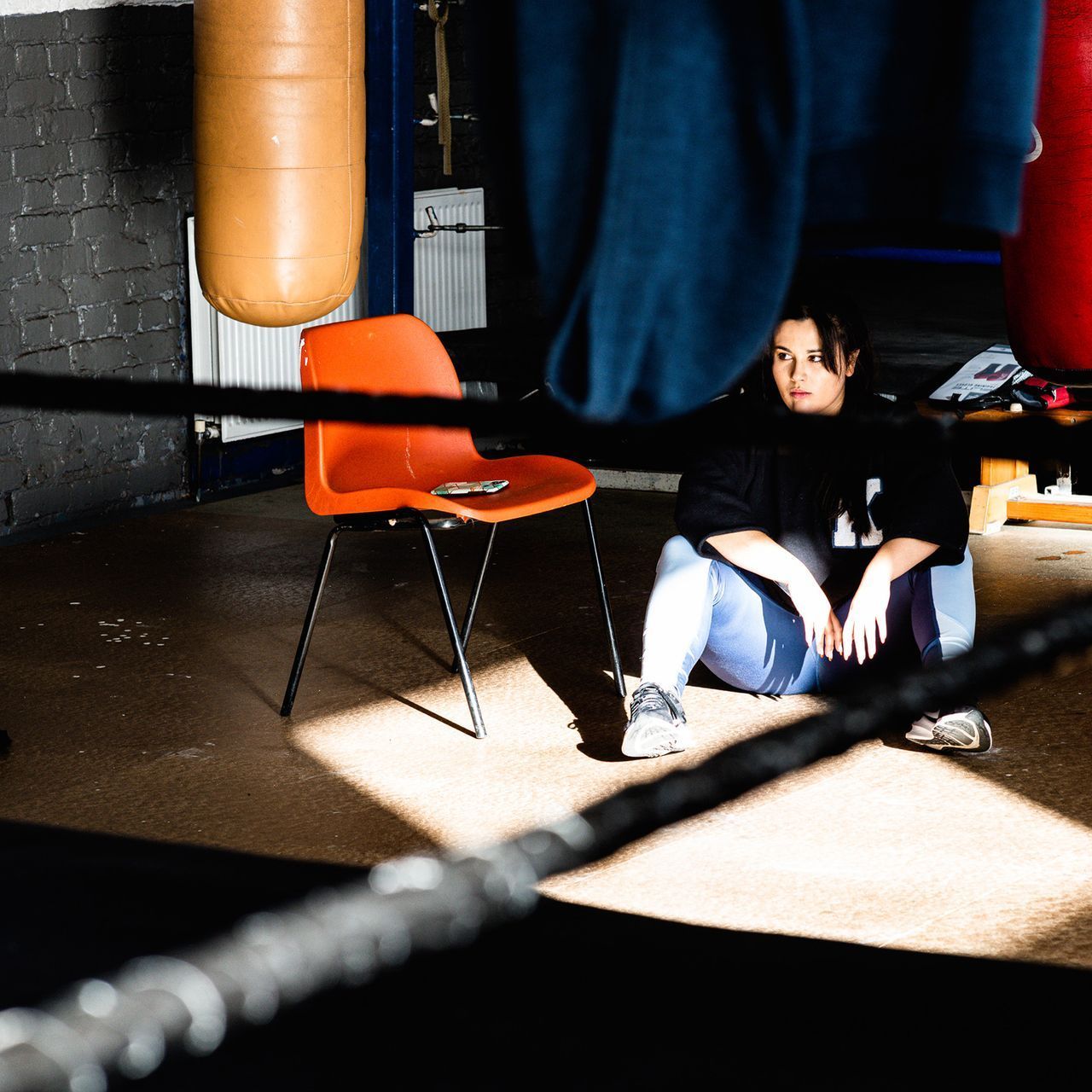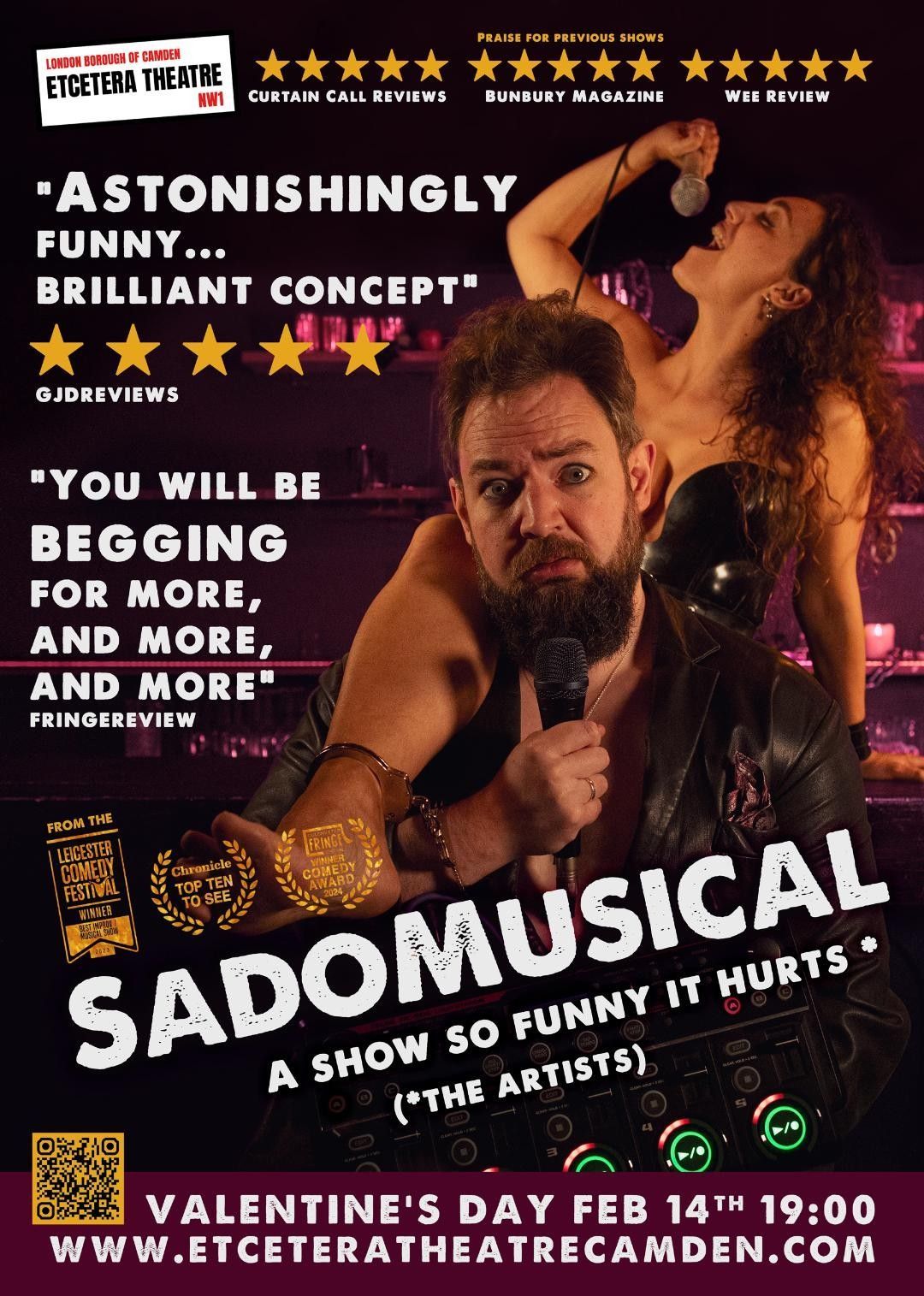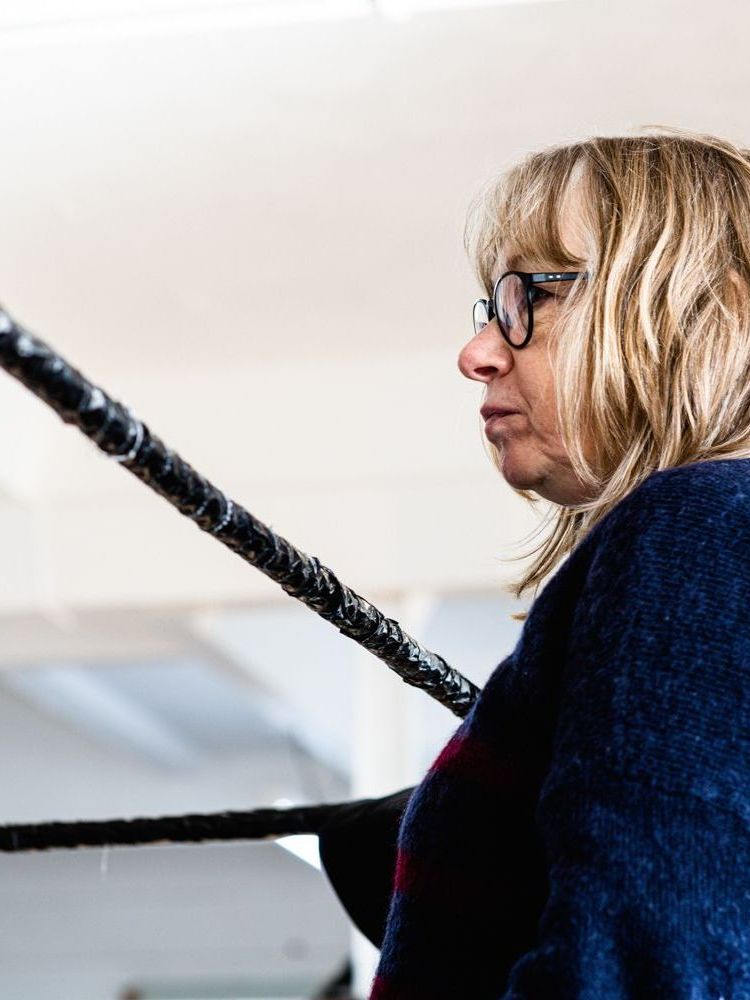"All plays are ultimately about humanity"
LPT: The tagline for the show is “I decide I need to box. I need this feeling.” What is your connection to boxing?
Mari LLoyd: Until I wrote this play I had no connection to boxing, but I wanted the character Rhys to have a focus to work towards that was also quite physical and with a definite end point.
After researching online, I became fascinated by the idea of the boxing gym being a community and a safe place for its members. I went along to a local boxing gym to interview people. I liked it so much that I joined myself and now train twice a week. I’m hooked.
Where did the inspiration for the play come from?
The play started as an image of a man putting fish into a freezer but never eating it, and a son that he leaves notes for but can’t communicate with.
The story then developed as I imagined what had happened to put them in this situation, how were they coping with it and what could disrupt the status quo?

Having workshopped the show at 12 Quays Boxing Gym on the Wirral, what has the audience reaction been like?
We were actually quite anxious doing the reading in a boxing gym. One of the actors commented that these were real people. We were portraying them, and we didn’t want to get it wrong. The response was incredible. They gave us fantastically useful feedback. Interestingly older ex-boxers said they could identify with both the male and female characters.
Images: Research and Development with actors Phillip John Jones and Emma Kaler (Photography: Tim Stubbs Hughes / Grey Swan)

Having grown up in a mining town in Wales, where and when did your connection with theatre begin?
I didn’t grow up with theatre. The first and only play that I saw growing up was Tonypandy Grammar School’s production of Twelfth Night. Still the funniest Malvolio I’ve seen, anyone that can make moody teenagers laugh has got to be good. Although I’ve always loved reading plays, working long hours meant that theatre trips were not on the agenda. So, I came to theatre late but I love the ritual of being in a place where as a collective body we experience a story and feel that connection to humanity. A boxing match is very similar, believe it or not. (I also support my local football team, the mighty Tranmere rovers)
Please could you tell us about your former career in the NHS and whether any of your experiences have fed into the writing of the show.
I think that everything you do in life leaves an imprint. When I was young I worked in a variety of places and specialties doing short stints in A+E, neurosurgery, oncology, rehab and medicine for the elderly, before settling in ophthalmology. It was all valuable experience, but what you learn from working in the NHS is that a good experience for the patient is down to human contact and kindness. When I left the NHS I interviewed the doctors, nurses, domestics and porters. A lot of them were worried that they were losing the humanity partly due to technology and partly due to a changed way of working. The most thanked person on a team is usually the one that held the patient’s hand. Alarmingly some managers would replace the hand with a buzzer for the patient to press. Missing the point, I feel.
All plays are ultimately about humanity.
You have already had many accolades for your plays (Match, Last Tango, Three Women, Bread and Circuses, Looking out and Elegy). Could you give aspiring playwrights any writing tips that have helped you along the way?
Accolades? Really? Okay we did get some nice reviews, but I’ll come back to that.
I was lucky when I started writing that there were good local festivals. The first, very young director I worked with, Liz Stevenson, gave me the tip that I shouldn’t worry about reviews. She’d just been to Edinburgh and for the same play they’d had two star reviews and four star reviews. Liz later went on to win Young Director of the Year award and directed at the Young Vic.
So tips:
- A lot of success is down to luck, but grab it when it comes.
- Take pleasure in the process.
- Keep going. Dreaming is good but nothing gets written until you put your backside on the chair and your fingers on the keyboard.
- Don’t write for accolades.
Coming into theatre later in life, what have been some of the challenges for you?
The challenges of writing the play are the same for everyone. Are these exaggerated as you get older? Possibly. The internal doubts, imposter syndrome and the internal critic you have to deal with. As for external challenges, I do get a heart sink if I see the words, next generation, up and coming or emerging artists. But at the end of the day the audience don’t care if you’re emerging or submerging, they just want to watch a good story.
Older artists will have a huge wealth of life experiences they can tap into. It’s good to remind yourself of that.
Coming back to the show, what is your connection to Jack Studio Theatre and how did you settle on this theatre for the London run of the show?
Through luck, fate or serendipity I got to meet Julia Stubbs. Julia has links with Jack Studio Theatre and has her own company 20 South Street and is a producer and director. She knows that the Jack champions new writing and she felt this was the ideal venue for us. Having a director that shares your vision is a blessing. I feel very lucky.
Why bring the show to London?
I think the play really suits a fringe theatre venue. I live on Merseyside, but I’ve set the play in the Rhondda valley. Although London doesn’t immediately spring to mind, it has great fringe venues and a large Welsh community. Eventually I would like to see the play performed back in Merseyside and also in Wales.
Has the show changed much in rehearsals, or has there been anything you found surprising as you share the work with your director, Julia Stubbs and the actors?
I guess that the main change is that it has become three dimensional. It’s gone from marks on a page to having movement sound and feeling. It really is like something coming to life. There were virtually no stage directions in the play, so seeing all this happen in the R+D with Julia and the actors has been amazing.
Who do you most hope to see in the audience.
Anyone. All welcome. Please come.
I think that the play will appeal to all ages, but I would like to see young people come along. We hope that some young people from the boxing community will be able to come. We have a fundraiser to enable us to give free tickets to local youth groups.
From the R+D feedback, we realised that this would be a good play to stimulate discussion about themes of guilt, anger and loss. There will be a Q+A after some performances.
I also have to say that you don’t need to be a boxing fan to connect with the story.
Finally, are you willing to share with us your favourite moment, or lines in the show and what these mean to you?
I’m fascinated by communication and the fact that this is often not done through words. With that in mind I’m really excited to see the effect of sound lighting and set on the production. I know that we’ve got some great people doing work on all this. As for an exact moment, I’m especially interested in how Rhys will communicate with his mother and how we’ll feel that as the audience, because I haven’t actually given him the words.
STILL HERE by Mari Lloyd
Directed by Julia Stubbs
Jack Studio Theatre, SE4
7 – 25 March 2023 7.30 pm
Free post show discussions 10 & 24 March
Produced by 20 South Street in association with Still Here Productions








